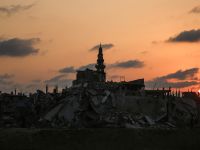Polling began calmly and on time Sunday in a partial re-run of elections held a week earlier in Zanzibar and widely condemned for massive delays and irregularities.
Most opposition parties, notably the Civic United Front (CUF), which seeks more autonomy for the Tanzanian offshore islands, have decided to boycott the re-run, after blaming President Benjamin Mkapa's ruling party for chaos on October 29.
The opposition says voting should be repeated in all 50 constituencies on semi-autonomous Indian Ocean islands, and not just in the 16 chosen by the Zanzibar Electoral Commission (ZEC).
No CUF election agents were deployed at any polling stations visited by AFP.
At a station in Stone Town, the historic urban heart of Zanzibar island, one agent claimed to be CUF when questioned but his official badge showed that he actually represented the ruling Chama cha Mapinduzi (CCM).
In stark contrast to the mayhem last week, when barely a polling station in this popular tourist destination opened on time and in many cases took several hours to become operational, this time voters were admitted on time at 7:00 am (0400 GMT).
While some polling stations visited by AFP early in the morning were busy and had moderately long queues outside, the boycott was evident in CUF strongholds, where numbers were considerably smaller than those seen a week ago.
Many of the first in line were security personnel of various sorts: policemen, soldiers, sailors and prison guards.
By midday, no voting was going on at many stations. Electoral officials generally reported turnout to be around 40 percent, much lower than estimates for October 29.
Officials were seen dozing over their desks at some of these stations.
Voters cast five ballots in the election, for Zanzibar's own president and legislature, for those of the Tanzanian union of which Zanzibar is a component, and for members of their local councils.
Ballot papers for votes related to Zanzibar were numbered in a way that could allow those who cast them to be identified.
Asked about this at a sleepy rural polling station, chief electoral commissioner Abdul Zumbe conceded that the secrecy of the ballot was compromised.
"I know, I know, I don't dispute it, but that is part of the electoral decree," he told journalists.
When it was put to him that this was an electoral wrong, Jumbe replied, "Yes, I agree with you."
On Friday, the European Union and the United States added their voices to a chorus of condemnation of Zanzibar's elections, with the former describing them as "grossly inadequate" while Washington expressed "deep concern" over "numerous irregularities" including fraud.
ZEC and the Tanzanian government have insisted serious problems only arose in the 16 constituencies on October 29, not across the state.
A young civil servant who gave his name only as Omar agreed.
"To me this is a free election. It is my right to vote. They (CUF) complain all the time," he said.
Asked why he had come to vote, a television producer at another polling station said "I have a government job."
CUF "has been given a fair chance. Nobody stopped them from coming," he added, describing the opposition party as "bad, because most CUF people are Arabs. In spite of being born here they maintain those colonial attitudes from Arab countries."
Although Zanzibar's electorate, 42 percent of which is involved in the re-run, is thought to be fairly evenly divided between CUF and CCM, in the light of the boycott and the irregularities surrounding the original polling day, the CCM is expected to emerge victorious when results are announced as counting and tallying continues into the night.
There is widespread fear that this will prompt CUF supporters to take to streets and the security forces to respond with a heavy hand -- ZANZIBAR, Tanzania (AFP)
© 2000 Al Bawaba (www.albawaba.com)







